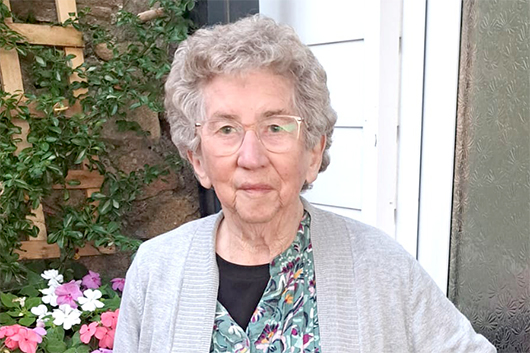Media Release
Date: 29 September 2025
RUH patient calls on women to check for signs of gynaecological cancer
September is Gynaecological Cancer Awareness Month and a patient treated for the cancer at the Royal United Hospitals Bath NHS Foundation Trust is calling on women to get themselves checked out if they have any unusual symptoms.

Mavis Bennett had been suffering with an irritation around her vaginal area and had tried numerous over the counter treatments which hadn't worked.
It was then she went to her GP, who found what looked like a small boil or abscess and referred her to the gynaecology team at the RUH.
Mavis said: "They got me in really quickly, gave me a thorough examination and told me it was vulval cancer.
"I was just devastated. When you are told something like that it just turns your world upside down."
Mavis, from Hinton Charterhouse, underwent surgery at the RUH which was initially successful. However, she continued to have regular biopsies as an outpatient and a year later was told the cancer had returned and she would need further surgery.
The second operation took place at Southmead Hospital in Bristol where she also had a skin graft.
"It was an incredibly stressful time, the worry and anxiety was terrible" said Mavis. "I was just very fortunate that the care I received both at the RUH and at Southmead was excellent. I was so well supported the whole way."
Mavis returned home where she was supported by carers for two weeks while she recovered.
She now attends a regular support group at the RUH's Dyson Cancer Centre for people who have had cancer.
"It's so nice to be able to talk to people who know what you've been through," she said. "They've all had similar experiences, so it's really helpful to just sit and chat.
"My message to women who are having unusual symptoms is please don't be embarrassed. If anything just doesn't feel right get to your GP straight away.
"The earlier you can get diagnosed and treated, the better things will be for you."
Vulval cancer is rare but can affect anyone born with a vulva, this includes women, trans men and people assigned female at birth.
Symptoms of vulval cancer can include things like a lump; a sore, growth (this may look and feel like a wart) or ulcer; bleeding and itching that does not get better.
These symptoms are very common and can be caused by many different conditions. Having them does not definitely mean you have vulval cancer but it's important to get them checked by a GP.
This is because if they're caused by cancer, finding it early means treatment is more likely to be successful.
You can find more information on the NHS website:
www.nhs.uk/conditions/vulval-cancer/symptoms/
There's lots more information and support about gynaecological cancer on the Macmillan Cancer Support website:
Gynaecological Cancer Awareness Month
ENDS

